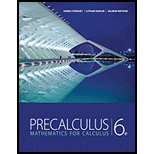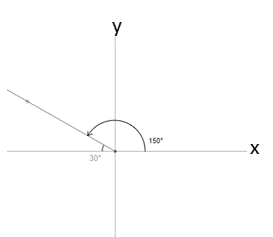
To calculate: The value of the trigonometric function
Answer to Problem 28E
The value of the trigonometric function
Explanation of Solution
Given information:
The trigonometric function
Formula used:
Coordinate plane is divided into four quadrants.
In the first quadrant all trigonometric functions that is
In the second quadrant only sine and cosecant trigonometric functions that is
In the third quadrant only tangent and cotangent trigonometric functions that is
In the fourth quadrant only cosine and secant trigonometric functions that is
The reference angle
Calculation:
Consider the provided trigonometric function
Denote,
First estimate the reference angle
From the figure provided below,

The provided angle has terminal side in Quadrant
The reference angle is,
Recall that coordinate plane is divided into four quadrants.
In the second quadrant only sine and cosecant trigonometric functions that is
So, tangent trigonometric function,
Therefore,
Thus, the value of the trigonometric function
Chapter 6 Solutions
Precalculus: Mathematics for Calculus - 6th Edition
- The Cartesian coordinates of a point are given. (a) (-8, 8) (i) Find polar coordinates (r, 0) of the point, where r > 0 and 0 ≤ 0 0 and 0 ≤ 0 < 2π. (1, 0) = (r. = ([ (ii) Find polar coordinates (r, 8) of the point, where r < 0 and 0 ≤ 0 < 2π. (5, 6) = =([arrow_forwardThe Cartesian coordinates of a point are given. (a) (4,-4) (i) Find polar coordinates (r, e) of the point, where r > 0 and 0 0 and 0 < 0 < 2π. (r, 6) = X 7 (ii) Find polar coordinates (r, 8) of the point, where r < 0 and 0 0 < 2π. (r, 0) = Xarrow_forwardr>0 (r, 0) = T 0 and one with r 0 2 (c) (9,-17) 3 (r, 8) (r, 8) r> 0 r<0 (r, 0) = (r, 8) = X X X x x Warrow_forward
- 74. Geometry of implicit differentiation Suppose x and y are related 0. Interpret the solution of this equa- by the equation F(x, y) = tion as the set of points (x, y) that lie on the intersection of the F(x, y) with the xy-plane (z = 0). surface Z = a. Make a sketch of a surface and its intersection with the xy-plane. Give a geometric interpretation of the result that dy dx = Fx F χ y b. Explain geometrically what happens at points where F = 0. yarrow_forwardExample 3.2. Solve the following boundary value problem by ADM (Adomian decomposition) method with the boundary conditions მი მი z- = 2x²+3 дг Əz w(x, 0) = x² - 3x, θω (x, 0) = i(2x+3). ayarrow_forward6. A particle moves according to a law of motion s(t) = t3-12t2 + 36t, where t is measured in seconds and s is in feet. (a) What is the velocity at time t? (b) What is the velocity after 3 s? (c) When is the particle at rest? (d) When is the particle moving in the positive direction? (e) What is the acceleration at time t? (f) What is the acceleration after 3 s?arrow_forward
- Construct a table and find the indicated limit. √√x+2 If h(x) = then find lim h(x). X-8 X-8 Complete the table below. X 7.9 h(x) 7.99 7.999 8.001 8.01 8.1 (Type integers or decimals rounded to four decimal places as needed.)arrow_forwardUse the graph to find the following limits. (a) lim f(x) (b) lim f(x) X-1 x→1 (a) Find lim f(x) or state that it does not exist. Select the correct choice X-1 below and, if necessary, fill in the answer box within your choice. OA. lim f(x) = X-1 (Round to the nearest integer as needed.) OB. The limit does not exist. Qarrow_forwardOfficials in a certain region tend to raise the sales tax in years in which the state faces a budget deficit and then cut the tax when the state has a surplus. The graph shows the region's sales tax in recent years. Let T(x) represent the sales tax per dollar spent in year x. Find the desired limits and values, if they exist. Note that '01 represents 2001. Complete parts (a) through (e). Tax (in cents) T(X)4 8.5 8- OA. lim T(x)= cent(s) X-2007 (Type an integer or a decimal.) OB. The limit does not exist and is neither ∞ nor - ∞. Garrow_forward
 Calculus: Early TranscendentalsCalculusISBN:9781285741550Author:James StewartPublisher:Cengage Learning
Calculus: Early TranscendentalsCalculusISBN:9781285741550Author:James StewartPublisher:Cengage Learning Thomas' Calculus (14th Edition)CalculusISBN:9780134438986Author:Joel R. Hass, Christopher E. Heil, Maurice D. WeirPublisher:PEARSON
Thomas' Calculus (14th Edition)CalculusISBN:9780134438986Author:Joel R. Hass, Christopher E. Heil, Maurice D. WeirPublisher:PEARSON Calculus: Early Transcendentals (3rd Edition)CalculusISBN:9780134763644Author:William L. Briggs, Lyle Cochran, Bernard Gillett, Eric SchulzPublisher:PEARSON
Calculus: Early Transcendentals (3rd Edition)CalculusISBN:9780134763644Author:William L. Briggs, Lyle Cochran, Bernard Gillett, Eric SchulzPublisher:PEARSON Calculus: Early TranscendentalsCalculusISBN:9781319050740Author:Jon Rogawski, Colin Adams, Robert FranzosaPublisher:W. H. Freeman
Calculus: Early TranscendentalsCalculusISBN:9781319050740Author:Jon Rogawski, Colin Adams, Robert FranzosaPublisher:W. H. Freeman
 Calculus: Early Transcendental FunctionsCalculusISBN:9781337552516Author:Ron Larson, Bruce H. EdwardsPublisher:Cengage Learning
Calculus: Early Transcendental FunctionsCalculusISBN:9781337552516Author:Ron Larson, Bruce H. EdwardsPublisher:Cengage Learning





